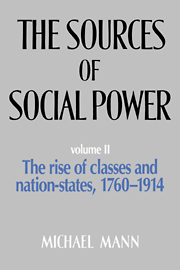Book contents
- Frontmatter
- Contents
- Preface
- 1 Introduction
- 2 Economic and ideological power relations
- 3 A theory of the modern state
- 4 The Industrial Revolution and old regime liberalism in Britain, 1760–1880
- 5 The American Revolution and the institutionalization of confederal capitalist liberalism
- 6 The French Revolution and the bourgeois nation
- 7 Conclusion to Chapters 4–6: The emergence of classes and nations
- 8 Geopolitics and international capitalism
- 9 Struggle over Germany: I. Prussia and authoritarian national capitalism
- 10 Struggle over Germany: II. Austria and confederal representation
- 11 The rise of the modern state: I. Quantitative data
- 12 The rise of the modern state: II. The autonomy of military power
- 13 The rise of the modern state: III. Bureaucratization
- 14 The rise of the modern state: IV. The expansion of civilian scope
- 15 The resistible rise of the British working class, 1815–1880
- 16 The middle-class nation
- 17 Class struggle in the Second Industrial Revolution, 1880–1914: I. Great Britain
- 18 Class struggle in the Second Industrial Revolution, 1880–1914: II. Comparative analysis of working-class movements
- 19 Class struggle in the Second Industrial Revolution, 1880–1914: III. The peasantry
- 20 Theoretical conclusions: Classes, states, nations, and the sources of social power
- 21 Empirical culmination – over the top: Geopolitics, class struggle, and World War I
- Appendix: Additional tables on state finances and state employment
- Index
4 - The Industrial Revolution and old regime liberalism in Britain, 1760–1880
Published online by Cambridge University Press: 04 August 2010
- Frontmatter
- Contents
- Preface
- 1 Introduction
- 2 Economic and ideological power relations
- 3 A theory of the modern state
- 4 The Industrial Revolution and old regime liberalism in Britain, 1760–1880
- 5 The American Revolution and the institutionalization of confederal capitalist liberalism
- 6 The French Revolution and the bourgeois nation
- 7 Conclusion to Chapters 4–6: The emergence of classes and nations
- 8 Geopolitics and international capitalism
- 9 Struggle over Germany: I. Prussia and authoritarian national capitalism
- 10 Struggle over Germany: II. Austria and confederal representation
- 11 The rise of the modern state: I. Quantitative data
- 12 The rise of the modern state: II. The autonomy of military power
- 13 The rise of the modern state: III. Bureaucratization
- 14 The rise of the modern state: IV. The expansion of civilian scope
- 15 The resistible rise of the British working class, 1815–1880
- 16 The middle-class nation
- 17 Class struggle in the Second Industrial Revolution, 1880–1914: I. Great Britain
- 18 Class struggle in the Second Industrial Revolution, 1880–1914: II. Comparative analysis of working-class movements
- 19 Class struggle in the Second Industrial Revolution, 1880–1914: III. The peasantry
- 20 Theoretical conclusions: Classes, states, nations, and the sources of social power
- 21 Empirical culmination – over the top: Geopolitics, class struggle, and World War I
- Appendix: Additional tables on state finances and state employment
- Index
Summary
The British paradox is laid out in Chapter 1: Britain pioneered the Industrial Revolution – the greatest surge in collective power in world history – yet its distributive power relations saw no revolution. On the mainland, excluding Ireland, there was gradual representative reform and national consolidation. Why?
Revisionist economic historians have offered the simplest solution to the paradox: They take “Revolution” out of the Industrial Revolution. Industrialization, they say, was also gradual, with only moderate structural change. Some Marxists also downplay industrialization, emphasizing the earlier transition from feudalism to capitalism, now ending with a shift from agrarian-commercial to commercial-industrial capitalism, disturbed by early proletarian stirrings (E. P. Thompson 1963). Whigs see a more diffuse evolutionary modernization, seeing industrial capitalism as interacting with the early achievement of civil rights and constitutional government to develop steadily greater citizenship and democracy (Plumb 1950: 140; Marshall 1963). Moore (1973: chapter 1) combines Whig and Marxian views: Britain evolved through reform to democracy because of the absence of a landholding nobility using labor-repressive agriculture and the presence of a large bourgeoisie. Marxists and Whigs believe industrial capitalism forced democracy on the state. Tories disagree: The old regime still commanded ideology and the state and extracted deference well into the nineteenth century. Its eventual decline came more through its own mistakes and divisions than through pressures exerted by industrial society (Moore 1976; Clark 1985).
- Type
- Chapter
- Information
- The Sources of Social Power , pp. 92 - 136Publisher: Cambridge University PressPrint publication year: 1993



